 |

Tools:








Bandthology Tones Minds With TriviaReviewers Applaud Design But Struggle With Musicology
| “This game is adaptable to group play and …different music tastes.” — Sue Christensen, mother |
TDmonthly Magazine’s Tweens & Teens Roundtable participants tested their knowledge of popular musical groups, history and trivia when they played Bandthology: The Board Game for Music Lovers. It combines musical knowledge in a game board format and covers a wide variety of musical genres. Although the game design was applauded by nearly all participants, Bandthology did not strike a chord with everyone.
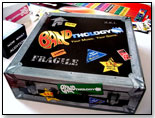 BANDthology - The Board Game for Music Lovers by BANDTHOLOGY BANDthology - The Board Game for Music Lovers by BANDTHOLOGY
Age: 8 and Up
Gender: Boys and Girls
Category: Board Games
MSRP: $30.00
TDmonthly rating:

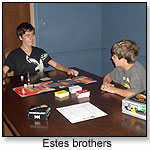 What It Is: Bandthology is a board game that tests players on knowledge of musical groups, history, trivia and terminology. Featuring a guitar-shaped playing field, the game has cards that question musical history and knowledge as well as musical lyrics. Players strive to be the first to form a supergroup of six musicians; each player wins a musician by completing a circuit on the neck of the guitar-shaped playing field. Now what? cards give a fortune or misfortune to the player who draws them. Audition cards, similar to charades, are mixed in with the Now what? cards and allow players to sing lyrics. Instructions included offer alternatives for advanced play and for novice play, as well as for team play option. What It Is: Bandthology is a board game that tests players on knowledge of musical groups, history, trivia and terminology. Featuring a guitar-shaped playing field, the game has cards that question musical history and knowledge as well as musical lyrics. Players strive to be the first to form a supergroup of six musicians; each player wins a musician by completing a circuit on the neck of the guitar-shaped playing field. Now what? cards give a fortune or misfortune to the player who draws them. Audition cards, similar to charades, are mixed in with the Now what? cards and allow players to sing lyrics. Instructions included offer alternatives for advanced play and for novice play, as well as for team play option.
What the Moms Thought: “This game is adaptable to group play and, to some extent, to different music tastes,” enthused Christensen. “The idea to make the game board look like a guitar was great!” raved Estes. She continued, “The name of the game, Bandthology, and the phrase, ‘Your Music, Your Game,’ are creative and reflective of the actual game.”
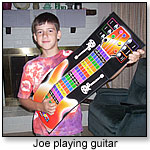 She also appreciated the educational trivia and history. Wilson was pleased to see that this game could accommodate more than four players, so her family of six could play together. She also liked the hourglass, “which kept the game going without having to frustrate someone by asking them to give up.” She also appreciated the educational trivia and history. Wilson was pleased to see that this game could accommodate more than four players, so her family of six could play together. She also liked the hourglass, “which kept the game going without having to frustrate someone by asking them to give up.”
Ledford liked the ease of set up and the instructions to alter the game for ‘novice’ play. “Although many naturally focused on popular music, I pointed out we can also use hymns, children’s songs, Christmas carols, etc., when needed, to play the game,” she said.
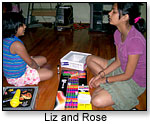 What the Kids Thought: “Sweet! Give me the horn man,” said Mac (15) as he earned his first musician. He called the game’s concept “creative.” Victoria (14) agreed, “The idea of a game revolving around music is pretty cool.” Tim (16) and Andrew (14) told their mom they would have enjoyed the game more if they had played with friends rather than their younger siblings. What the Kids Thought: “Sweet! Give me the horn man,” said Mac (15) as he earned his first musician. He called the game’s concept “creative.” Victoria (14) agreed, “The idea of a game revolving around music is pretty cool.” Tim (16) and Andrew (14) told their mom they would have enjoyed the game more if they had played with friends rather than their younger siblings.
Both Ben (8) and Joe (9) fumbled at the game as they didn’t know as many song lyrics or musical groups as their older siblings did. “This game is for people who know songs!” exclaimed Ben (8). Justin (13) agreed, “This is an older person’s game; the questions are too hard.” Tom (16) opted not to play since he is not interested in music.
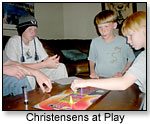 “I can’t believe my guitar player spontaneously combusted!” yelled Joe (9) after drawing a Now what? card. Christensen reported, “Kent (14) liked the ‘Now what?’ cards because they didn’t require answers.” Wilson’s children also liked the ‘Now what?’ cards “because they could advance or hinder a player,” observed Wilson. Liz (13) liked the team-play option. “I can’t believe my guitar player spontaneously combusted!” yelled Joe (9) after drawing a Now what? card. Christensen reported, “Kent (14) liked the ‘Now what?’ cards because they didn’t require answers.” Wilson’s children also liked the ‘Now what?’ cards “because they could advance or hinder a player,” observed Wilson. Liz (13) liked the team-play option.
Joe (9) and Liz (13) liked the colorful game board; however, Elise (10) and Steven (9) were discouraged at the repeated return to the starting position during game play. Joe (9), Victoria (14), Andrew (14), and Tim (16) found the game took too long.
What the Kids Learned: Christensen observed that the educational opportunity was not taken advantage of in this game, since only one of the cards explained the correct answer. The Estes boys learned about popular music history and trivia; “Their dad helped them with questions, which helped connect the generations with popular music trivia,” Estes noticed. Liz (13) said, “It challenges your music knowledge.”
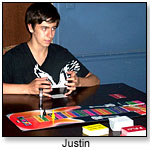 “When presented with a musicology card based on an unfamiliar genre (such as country music, for example), the children were not inspired to delve into it further,” observed Ledford. “They were simply left feeling ‘the generation gap’ exposed in music and musicians.” “When presented with a musicology card based on an unfamiliar genre (such as country music, for example), the children were not inspired to delve into it further,” observed Ledford. “They were simply left feeling ‘the generation gap’ exposed in music and musicians.”
Initially, Elise (10) and Steven (9) thought their teenage brothers would best them at this game, but they “soon found that they knew many more lyrics than they assumed,” noted Wilson. She also commented, “We all learned that Andrew thinks quickly on his feet and can make up songs and realistic — though false — titles at the drop of a hat (or roll of the die).”
How to Improve It: Christensen would like to see separate boxes for each card category to speed up finding the next card in the required category. She also suggested improvements be made to the pawns, as one was broken upon arrival. Estes noted that none of her sons wanted to use the purple pawn and would like to see a blue pawn instead.
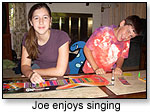 Although the game board design was very popular with most of the participants, the Wilson children, who were discouraged at the repeated return to the start line, told their mom, “The fault lies in the linear board construction due to the natural instinct that when you come to the end, you should be done.” She recommended a design that allows for a continuous game path. Although the game board design was very popular with most of the participants, the Wilson children, who were discouraged at the repeated return to the start line, told their mom, “The fault lies in the linear board construction due to the natural instinct that when you come to the end, you should be done.” She recommended a design that allows for a continuous game path.
Although there was only one swear word, Christensen would like to see it removed so the game meets parental guidelines for children. Estes said, “Justin (13) thought there should be an American version since he has no knowledge of Canadian music or artists (questions on cards revealed this).”
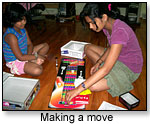 Ledford suggested making the musicology cards easier. “We found it tremendously difficult to answer all six of any one musicology card,” she said. Provide explanations, recommended Christensen, so the players can learn why an answer is incorrect. “The potential for this to be a learning game is great, but unrealized,” she lamented. Ledford suggested making the musicology cards easier. “We found it tremendously difficult to answer all six of any one musicology card,” she said. Provide explanations, recommended Christensen, so the players can learn why an answer is incorrect. “The potential for this to be a learning game is great, but unrealized,” she lamented.
Several parents thought the minimum target age of the game should be much higher than 8. Estes suggested, “Perhaps there could be a junior edition for kids ages 6 to 14, or a teen edition.” She and Ledford could also envision the game in several versions focused on separate decades, including one with a current or very recent focus for younger players.
“It would be more fun if a microphone and karaoke were added,” Thomas said.
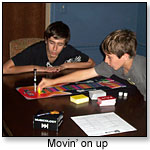 Would You Want Another Toy Like This? Wilson was surprised to see that Elise (10) and Steven (9), rather than her teenage sons, wanted to play again. “They seem to derive more enjoyment with subsequent play as they become more familiar with the game,” she observed. Tim (16) was intrigued by the travel version. Ledford concluded, “This really is a game for serious music lovers who appreciate a wide variety of musical genres and musicians. As Dad noted, it’s also a game for those who can recall song titles and/or artists quickly!” Would You Want Another Toy Like This? Wilson was surprised to see that Elise (10) and Steven (9), rather than her teenage sons, wanted to play again. “They seem to derive more enjoyment with subsequent play as they become more familiar with the game,” she observed. Tim (16) was intrigued by the travel version. Ledford concluded, “This really is a game for serious music lovers who appreciate a wide variety of musical genres and musicians. As Dad noted, it’s also a game for those who can recall song titles and/or artists quickly!”
Roundtable participants are stay-at-home parent Sue Christensen with Mac (15), Kent (14), Joshua (11) and Ben (8); homeschool parent Audra Estes with Justin (13) and Sebastian (10); Susan Ledford, editor of the "Homeschool Resources Directory for SC,” with Victoria (14) and Joe (9); machine operator Geena Thomas with Tom (16), Liz (13) and Rose (8); and homeschool parent Teresa Wilson with Tim (16), Andrew (14), Elise (10) and Steven (9).
 Writer's Bio: Writer's Bio: Susan Ledford is the writer, editor and publisher of the "Homeschool Resources Directory for S.C." She has been evaluating toys and games for TDmonthly's Roundtable reviews since 2005. She also is a homeschool veteran of seven years. Read more articles by this author
THIS BANNER IS AN AD:

• • • • • • • • • • • • • • • • • | • • • • • • • • • • • • • • • • |
Back to TDmonthly's front page
|  |
Advertise on TDmonthly

|

